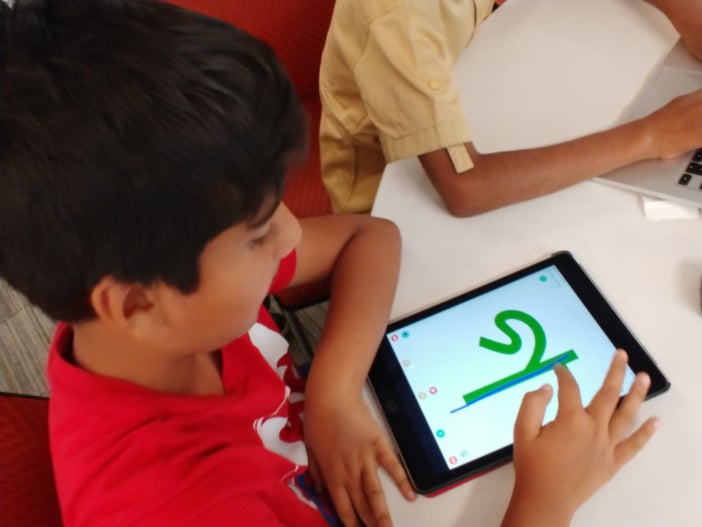Local Bangla School Visits Penn’s South Asia Collection

“There’s something quite powerful about people coming together to look at a text or watch a film in the language of their home country,” says Mallika Sircar, Library Specialist in Penn Libraries’ South Asia Collection.
Since 2015, Sircar has helped coordinate bi-annual library visits for the Shopan Bangla School, an organization parented by the Bengali Association of Delaware Valley (BADV). The most recent trip took place Saturday, July 20, when parents, students, teachers, and Libraries’ staff convened in the Van Pelt-Dietrich Library Center (Van Pelt) for a program incorporating the physical holdings of the Penn Libraries’ South Asia Collection with the Libraries’ digital resources.
“The very fact that these unique materials are here amazes visitors,” says Sircar. “And it’s a privilege to be able to share these resources with them, especially with groups from South Asian cultural communities.”
The primary mission of the Shopan Bangla School is cultural synthesis: to educate the American-born children of Bengali parents in the language and traditions of their family so that they might draw fruitful connections between the two cultures. “A lot of the school’s activities are about creative expression,” explains Sircar. “Students aren’t simply reading Bengali books — they’re getting ideas from Bengali books that they then translate into their own pan-cultural art.”
In the first part of Saturday’s program, Shopan instructors read Bengali stories from the South Asia Collection aloud to the gathered students. Students then moved to the multimedia Van Pelt Collaborative Classroom for an hour-long digital session, during which they created comic strips (inspired by the stories) using graphic design and Bengali language softwares. Lastly, the students were joined by their parents for a screening of famed Indian filmmaker Satyajit Ray’s “Joi Baba Felunath” (“The Elephant God”), one of many Bengali films in the South Asia Collection.
“The South Asia collection has been one of the country’s largest and richest for well over a century,” says Collection bibliographer Jef Pierce. In the 1880s, Penn became one of the first universities in the country to offer Sanskrit as both a major and minor field of study, and the American Institute of Indian Studies (now based in Chicago) originally operated out of Van Pelt. The Collection presently contains nearly 130,000 titles and represents 40 languages; in addition, Penn Libraries houses one of the largest troves of South Asian manuscripts in North America, as well as a photo archive of over 100,000 images related to art and archaeology in India.
“One of my goals as bibliographer of this collection has been to expand our work beyond the academic bubble,” says Pierce. “Events such as the Shopan field trip underscore how rich our collaborations with the surrounding community can be. It really is a mutually beneficial relationship: not only are we able to offer valuable resources, but we learn and grow when we see these holdings and services through fresh eyes.”
The mutual benefit is mutually perceived. “I can attest to how difficult it is for individuals and smaller organizations to get access to such materials and facilities,” says Partha Debnath, one of the field trip’s coordinators and the founder of Friends of Bangla School (a coordinating body for area Bengali schools). “Penn’s sharing of these resources makes it possible to expose second-generation Bengalis to their parents’ ethnicity and culture. In this way, the University functions as a pillar to support the local Bengali community’s activities.”
Date
July 26, 2019
